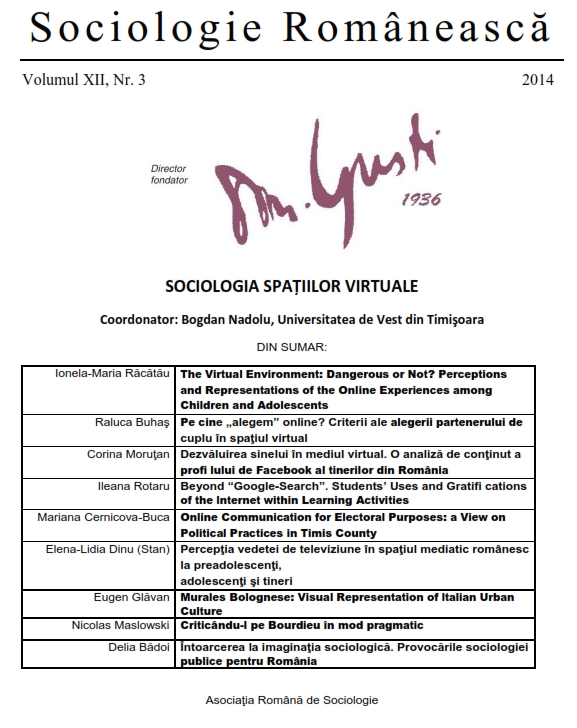Întoarcerea la imaginaţia sociologică. Provocările sociologiei publice pentru România
Back to Sociological Imagination. The Challenges of Public Sociology for Romania
Author(s): Delia BădoiSubject(s): Social Theory
Published by: Institutul de cercetare a Calității Vieții (ICCV)
Keywords: Public sociology; sociology of science; reflexivity; sociological knowledge; knowledge society;
Summary/Abstract: The present article starts with a discussion detached from the academic community of American sociologists, which is based on public sociology, with reference on relevancy and utility of sociological knowledge production: “Sociology for whom”; “What kind of sociology?” Through the scientific studies, the hypothesis of this article shows that sociology as science is at this moment unable to contribute to the use of its own results, due to the lack of a truly interested audience in the extra-academic sphere. The development of a critical and reflexive theory based on the relationship between academic sociology, public sociologist and the public sphere represents an important step in this research about public sociology. The thesis that we want to demonstrate contains, on the one side, critical explanations about the current issue of the sociologist as a public intellectual and on the other side, it refers to the scientific production of sociology in a knowledge society.However, the new risk society born in the recent era of modernity, have devoted a new type of challenges for sociology as science. In the French sociology, Pierre Bourdieu opened an important chapter on the issue of sociology as science and his reflexivity “Science of science and reflexivity” (2001) and also in the American sociology, Charles Wright Mills in “The Sociological Imagination” (1959) introduces a critical theory of scientific knowledge and the abstract empiricism of sociological research of the 1950s. More recently, the debate about the engagement of sociology as a public science continued in the American academic space,when historical controversies in the development of critical theories was resumed by Michael Burawoy in Forsociology (2004). The social significance of the article theme consists in the answer of two questions: How does a public science look like? (1) What public for public sociology? (2) From the epistemological perspective of this article analysis, the interest of exploring the “public” reality of sociology is an important objective for giving an explanation about sociological knowledge in the current social construction. In conclusion, we propose to analyze the development of the practices of sociologists as public intellectuals in international academic context, especially to illustrate the challenges of public sociology for Romanian professional sociology.
Journal: Sociologie Românească
- Issue Year: 12/2014
- Issue No: 03
- Page Range: 106-117
- Page Count: 12
- Language: Romanian

